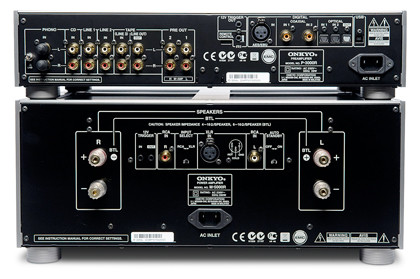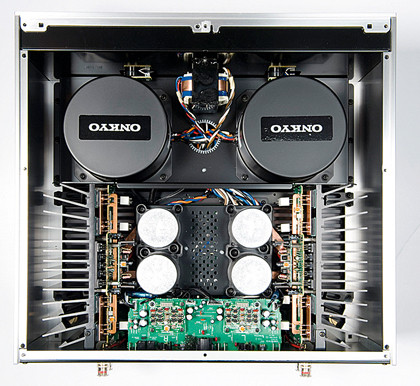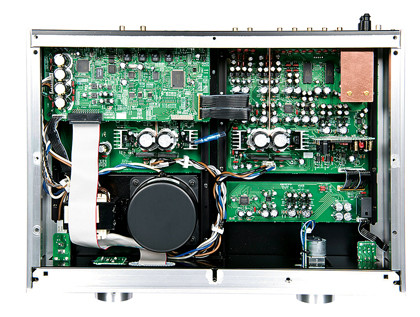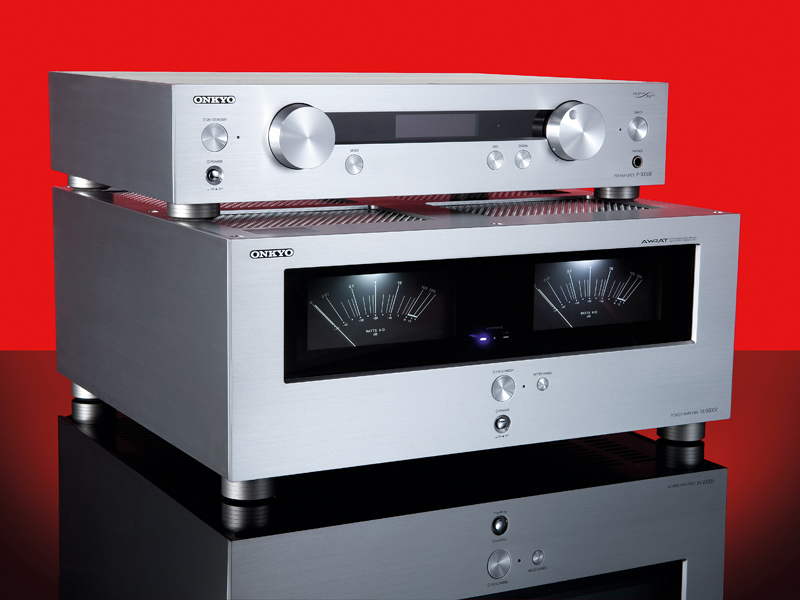TechRadar Verdict
Pros
- +
Superb-sounding combination
- +
Excellent build
- +
Impressive flexibility
Cons
- -
Will not flatter poor recordings
Why you can trust TechRadar
Onkyo has been out of the high-end hi-fi market for almost twenty years – long enough for us to believe that they had left it for good. But the brand is back and it has come out shooting.
The components you see here are the M-3000R and M5000R amplifier pairing which are part of a new range of elite, flagship hi-fi products for 2011. This on its own would be good news.
What makes it even better is the fact that these units are no-compromise designs, packed with features and with some very handsome styling, not to mention a whacking great pair of VU meters on the power amplifier which hark back to when Japanese high end was a force to be reckoned with.
This is also not a one-off exercise. These components are the fi rst of a number of new two-channel products. If these future products are as technically interesting as these two units here, we can't wait.
Entirely symmetrical
The M-5000R power amp is the more conventional of the two units. It uses a Class A/B layout to achieve 80 watts into eight ohms, rising to 150 into four.
The decision to use Class A/B is interesting, as many recent Onkyo stereo amplifiers have been Class D. The revision back to more conventional technology suggests that Onkyo feels there is life in the old power-hungry dog yet, at least at this price point.
The internal layout is entirely symmetrical and terminates in a hefty pair of speaker posts. Used in stereo mode, the M-5000R can only be used with unbalanced RCA inputs, but a single XLR input is fitted allowing use as a monoblock.
The VU meters on the front can be used at two different sensitivity measurements or can be switched off if too distracting. The inner child in us liked the meters far too much to do this and although not the most accurate gauges going, they do give a useful heads-up if you are overdriving.
The £1,700 P-3000R preamp is rather more unusual in comparison to the competition. As well as three line inputs, a tape loop and a MM phono stage, Onkyo has fitted no less than six digital inputs. These include a balanced AES-type fitting and a USB input, as well as a pair of each of the more conventional coaxial and optical connections.
All six inputs are decoded by a pair of 32-bit/192kHz Burr-Brown PCM1795 DACs and are selected off the same rotary selector as the analogue inputs. If you are not using the digital inputs, the entire board can be powered-down and the digital inputs disappear from the list selected by the input dial. This connectivity puts the P-3000R in a different group altogether to most similarly priced preamps.
The presence of a high-quality dual-mono DAC board means that the budget for a digital source need not be as high as might otherwise be the case for a conventional allanalogue preamp. Were we seeking the moon on a stick, we would have really liked the phono stage to support moving coil cartridges and for one of the two pre-outs to be a balanced type, to more easily allow the use of mono M-5000Rs, but this is still a huge amount of functionality for the money.

Both components are built in a fashion that is classic Japanese high end (although both are actually assembled in Malaysia). Panel gaps are minute, the top panel fixings are secured by beautifully countersunk bolts to keep the top panel flush and the controls move with a precision and solidity that suggests an equal amount of attention has been lavished on bits you cannot see.
Other than the display of the preamp – which might have looked slicker if a dot matrix had been used (it can be switched off) – this pair is built to the standard that is to be expected from similarly priced competition product.
Competition-beater?
The result of this unusual pairing is subtly different to most of the key competition. The Onkyo delivers a competitive power output and is built to the standards we expect at the price, but the selection of inputs on the preamp and the high-quality DAC board put it far ahead in terms of convenience. This is an amplifier designed with present and future developments in source equipment in mind rather than a 'by the numbers' exercise.

The last ingredient to what could be a very tasty recipe indeed is how it sounds. In a word – fabulous. Even from cold, the Onkyo is a fluent and open performer.
The 80 watts of the M-5000R feels unburstable in use and the pairing can deliver all, but the most extreme levels from most speakers. This ability translates into short listening sessions becoming all-evening affairs as you work through your music collection seeing what the Onkyo brings to their reproduction.
In the course of listening, the Onkyo shows itself to be a magnificent all-rounder with a real set of talents that benefit virtually all genres of music. This isn't a rockers' amp or a classical music amp. In the widest possible sense, it's for the music lover.
Astonishing vitality
The analogue inputs of the P-3000R are essentially transparent and allow the character of the source to be clearly present in the performance. Connecting a Michell Gyrodec and Naim Stageline phono stage is like listening to them directly with no sense of any intervening electronics present.

It almost goes without saying that the P-3000R proves totally silent in use, providing a unobtrusive backdrop to performances. The digital inputs of the P-3000R do, if anything, have a greater personality.
The digital board of the Onkyo is astonishingly insightful and able to extract incredible detail from recordings. The pairing will not flatter poor recordings, however. They're happier with the compressed version of a good recording than the lossless version of a poor one.
These traits extend to the USB input which – once the connected PC has been given the latest USB drivers available – work seamlessly and silently. The performance over USB is identical to the more conventional digital inputs.
Rewarding listen
Tonality with voices and instruments is wonderfully lifelike and unfailingly accurate in a soundstage that grows and shrinks perfectly with the size of the piece being played. The Onkyo is equally happy capturing the intimacy of a solo performer in a small studio as it is with an orchestra on the rampage in the largest of venues.
The timing and rhythmic ability of the pairing is also extremely high. Ask the Onkyo to pick up the pace and it does so effortlessly, but always slow down again when you need it to. Part of this fluency is down to the superb bass performance.
This pairing is everything that 21st Century high end should be. The M-5000R is an accomplished performer, able to find the measure and tempo of any recording thrown at it.
The P-3000R is a fantastic combination of conventional technology well implemented and an excellent and insightful set of digital inputs. The expected benefits of upgrading to an amplifier in this class are realised in no uncertain terms. At the same time, the Onkyo offers a step up in performance for all, but the most accomplished digital sources.
We've waited twenty years for an amp of this calibre from Onkyo. If these units are a statement of intent for Onkyo hi-fi product to come, we can't wait to see what the brand can do in 2011 and beyond across the whole spectrum of price points.
Follow TechRadar Reviews on Twitter: http://twitter.com/techradarreview

Ed Selley is a freelance writer who has been playing around with audio equipment – be it selling, supporting, marketing, installing or writing about it – for over 20 years. He worked with a variety of manufacturers before moving into reviewing over a decade ago and now writes about every category of equipment he can get his hands on. He owns more record players than any one human being strictly needs and an obsessively alphabetised record collection to use on it.
